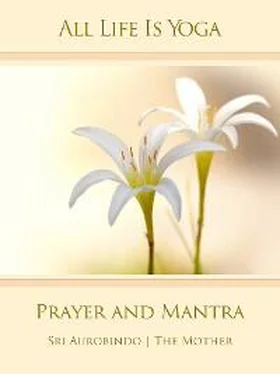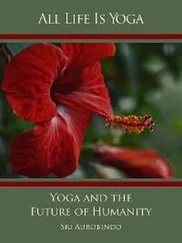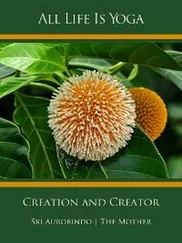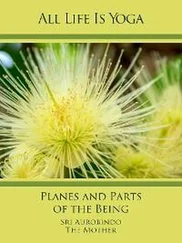The key, as I told you just now, is the sufficiently sincere aspiration or the sufficiently intense prayer. I said “or”, but I do not think it is “or”. There are people who like one better and others, the other. But in both there is a magical power, you must know how to make use of it.
There is something very beautiful in both, I shall speak to you about it one day, I shall tell you what there is in aspiration and what in prayer and why both of them are beautiful.... Some dislike prayer; if they entered deep into their heart, they would find it was pride – worse than that, vanity. And then there are those who have no aspiration, they try and they cannot aspire; it is because they do not have the flame of the will, it is because they do not have the flame of humility.
Both are needed. There must be a very great humility and a very great will to change one’s Karma.
* * *
Words of Sri Aurobindo
I don’t think you understood very well what Mother was trying to tell you. First of all she did not say that prayers or meditation either were no good – how could she when both count for so much in Yoga? What she said was that the prayer must well up from the heart on a crest of emotion or aspiration, the Japa or meditation come in a live push carrying the joy or the light of the thing in it. If done mechanically and merely as a thing that ought to be done (stern grim duty!), it must tend towards want of interest and dryness and so be ineffective.
*
Words of Sri Aurobindo
The aim of Yoga being union, its beginning must always be a seeking after the Divine, a longing after some kind of touch, closeness or possession. When this comes on us, the adoration becomes always primarily an inner worship; we begin to make ourselves a temple of the Divine, our thoughts and feelings a constant prayer of aspiration and seeking, our whole life an external service and worship. It is as this change, this new soul-tendency grows, that the religion of the devotee becomes a Yoga, a growing contact and union. It does not follow that the outward worship will necessarily be dispensed with, but it will increasingly become only a physical expression or outflowing of the inner devotion and adoration, the wave of the soul throwing itself out in speech and symbolic act.
*
Words of Sri Aurobindo
The Divine looks into the heart and removes the veil at the moment which he knows to be the right moment to do it. You have laid stress on the bhakti theory that one has only to call his name and he must reply, he must at once be there. Perhaps, but for whom is this true? For a certain kind of Bhakta surely who feels the power of the Name, who has the passion of the Name and puts it into his cry. If one is like that, then there may be the immediate reply – if not, one has to become like that, then there will be the reply. But some go on using the Name for years, before there is an answer. Ramakrishna himself got it after a few months, but what months! and what a condition he had to pass through before he got it! Still he succeeded quickly because he had a pure heart already – and that divine passion in it.
*
Words of the Mother
The whole of our life should be a prayer offered to the Divine.
*
Words of the Mother
Vital prayer: Steadiness and perseverance.
Mental prayer: Purity.
Integral prayer: The Divine Consciousness.
*
Words of the Mother
If you call or aspire with fear that you will not be heard and with doubts about the Divine’s answer then the adverse forces that are always on the watch, slip into your consciousness through the fear and the doubts and do their mischief. So, you must call with a true and sincere faith.
*
Words of the Mother
To aspire is indispensable. But some people aspire with such a conflict inside them between faith and absence of faith, trust and distrust, between the optimism which is sure of victory and a pessimism which asks itself when the catastrophe will come. Now if this is in the being, you may aspire but you don’t get anything. And you say, “I aspired but didn’t get anything.” It is because you demolish your aspiration all the time by your lack of confidence. But if you truly have trust.... Children when left to themselves and not deformed by older people have such a great trust that all will be well! For example, when they have a small accident, they never think that this is going to be something serious: they are spontaneously convinced that it will soon be over, and this helps so powerfully in putting an end to it.
Well, when one aspires for the Force, when one asks the Divine for help, if one asks with the unshakable certitude that it will come, that it is impossible that it won’t, then it is sure to come. It is this kind.... yes, this is truly an inner opening, this trustfulness. And some people are constantly in this state. When there is something to be received, they are always there to receive it. There are others, when there is something to have, a force descends, they are always absent, they are always closed at that moment; while those who have this childlike trust are always there at the right time.
And it is strange, isn’t it, outwardly there is no difference. They may have exactly the same goodwill, the same aspiration, the same wish to do good, but those who have this smiling confidence within them, do not question, do not ask themselves whether they will have it or not have it, whether the Divine will answer or not – the question does not arise, it is something understood.... “What I need will be given to me; if I pray I shall have an answer; if I am in a difficulty and ask for help, the help will come – and not only will it come but it will manage everything.” If the trust is there, spontaneous, candid, unquestioning, it works better than anything else, and the results are marvellous. It is with the contradictions and doubts of the mind that one spoils everything, with this kind of notion which comes when one is in difficulties: “Oh, it is impossible! I shall never manage it. And if it is going to be aggravated, if this condition I am in, which I don’t want, is going to grow still worse, if I continue to slide down farther and farther, if, if, if, if....” like that, and one builds a wall between oneself and the force one wants to receive. The psychic being has this trust, has it wonderfully, without a shadow, without an argument, without a contradiction. And when it is like that, there is not a prayer which does not get an answer, no aspiration which is not realised.
*
Words of the Mother
“I begin to meditate and pray ardently and fervently, my aspiration is intense and my prayer full of devotion; and then, after a certain length of time – sometimes short, sometimes long – the aspiration becomes mechanical and the prayer purely verbal. What should I do?”
This is not an individual case, it is extremely common. I have already said this a number of times, but still it was in passing – that people who claim to meditate for hours every day and spend their whole day praying, to me it seems that three-fourths of the time it must be absolutely mechanical; that is to say, it loses all its sincerity. For human nature is not made for that and the human mind is not built that way.
In order to concentrate and meditate one must do an exercise which I could call the “mental muscle-building” of concentration. One must really make an effort – as one makes a muscular effort, for instance, to lift a weight – if you want the concentration to be sincere and not artificial.
The same thing for the urge of prayer: suddenly a flame is lit, you feel an enthusiastic élan, a great fervour, and express it in words which, to be true, must be spontaneous. This must come from the heart, directly, with ardour, without passing through the head. That is a prayer. If there are just words jostling in your head, it is no longer a prayer. Well, if you don’t throw more fuel into the flame, after a time it dies out. If you do not give your muscles time to relax, if you don’t slacken the movement, your muscles lose the capacity of taking strains. So it is quite natural, and even indispensable, for the intensity of the movement to cease after a certain time. Naturally, someone who is accustomed to lifting weights can do it much longer than one who has never done it before. It is the same thing; someone who is accustomed to concentration can concentrate much longer than one who is not in the habit. But for everybody there comes a time when one must let go, relax, in order to begin again. Therefore, whether immediately or after a few minutes or a few hours, if the movement becomes mechanical, it means that you have relaxed and that you need no longer pretend that you are meditating. It is better to do something useful.
Читать дальше












